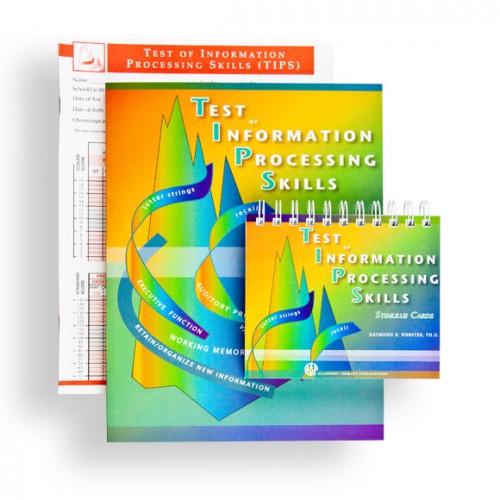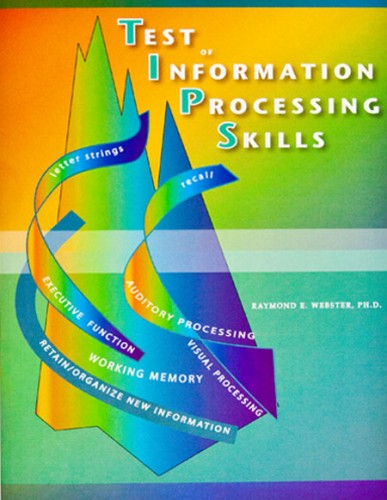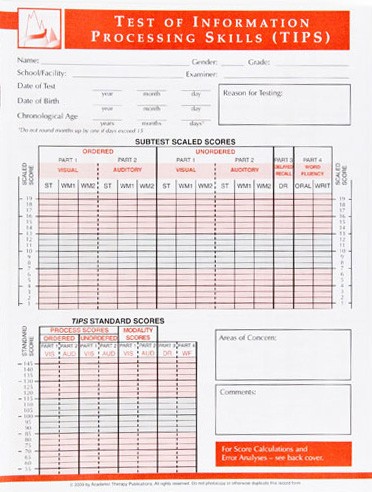The Test of Information Processing Skills (TIPS) provides clinicians with quick and reliable measures of how well a person processes information (Letter strings) presented visually and auditorily. Short-term, working memory, and delayed recall tasks show differences between sequenced and nonsequenced retention (a hallmark of those with learning and/or executive function disabilities). Error analyses (Proactive Interference and Acoustic Intrusion) document the extent to which new information is lost or its retention is inhibited. Although TIPS had is genesis in the Learning Efficiency Test (R. Webster, 1981, 1992, and 1998), it features new items, new subtests (Delayed Recall and Word Fluency), new scoring procedures, and new norms. It was normed on a national sample of 3,314 individuals.
TIPS Performance Relates To:
- Executive function
- Working memory
- Auditory processing and visual processing
- Learning / retaining / organizing / using new information TIPS assesses
- How a person processes information that is either seen or heard
- How much information is retained (short-term, working memory, and delayed recall)
- How it is retained (in the sequence presented or in a scrambled order)
- The effects of interference on recall
- Word fluency
TIPS Subtests
Visual and Auditory Modalities
- Letter strings are presented and the letters are recalled immediately, then recalled after an interference task (counting), then recalled again after a longer interference task (repeating a sentence)
- Scores differentiate letters recalled in the exact sequence as presented (ordered recall) and letters recalled out of sequence (unordered recall)
- Error analysis of Acoustic Intrusion and Proactive Interference effects shows the impact of acoustically similar or previously learned information on recall processes
Delayed Recall
- Animal or fruit names from the distractor sentences are recalled
Word Fluency
- Word lists are generated orally within one-minute spans
- Word lists are written within one-minute spans
Administration and Scoring
The TIPS can be administered in about 30 minutes. For Visual and Auditory Modality subtests, memory is assessed in three recall conditions using strings of two to nine nonrhyming letters; ordered and unordered recall scores are also obtained from the same test administration. Separate scores are provided for Delayed Recall and Word Fluency subtests. Results are reported as scaled scores, standard scores, percentile ranks, and age equivalents.
-

Test of Information Processing Skills (TIPS)
TIPS Complete Kit
$185.00 -

Test of Information Processing Skills (TIPS)
TIPS Examiner's Manual
$75.00 -

Test of Information Processing Skills (TIPS)
TIPS Protocols (25)
$50.00 -

Test of Information Processing Skills (TIPS)
TIPS Stimulus Cards
spiral-bound book
$72.00
- Copyright 2009

 Proud to be Canadian
Proud to be Canadian